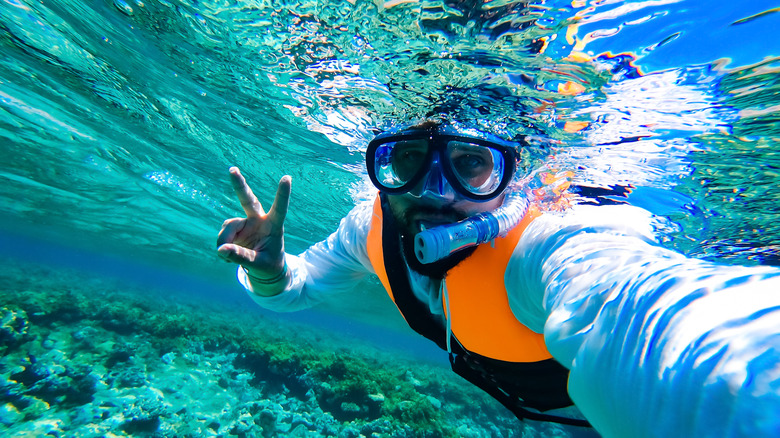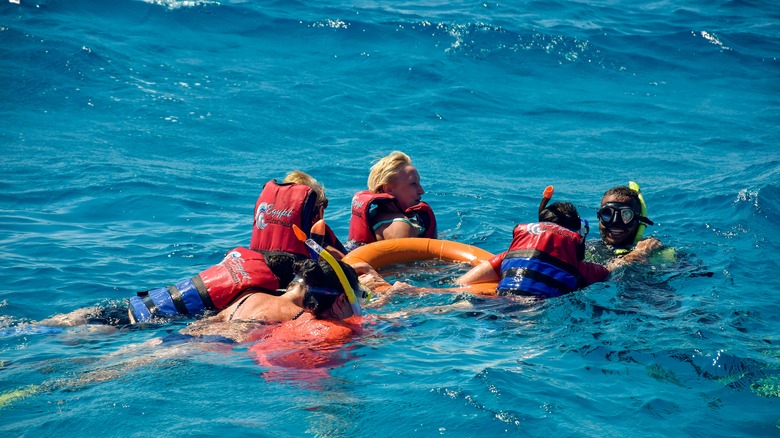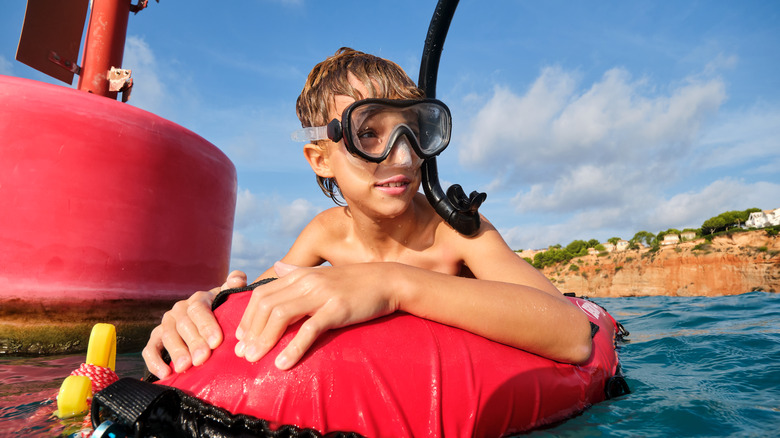The Best And Safest Way For Non-Swimmers To Go Snorkeling
Can you really snorkel if you don't swim? Is it even safe? To answer these and other questions, Islands spoke exclusively with Dr. Matthew Zimmerman, owner of Oahu Dolphin Divers in Hawaii. While there is disagreement among experts as to whether or not non-swimmers should snorkel, no one is more qualified to give a safety-conscious thumbs-up than Dr. Zimmerman, who holds a PhD in molecular biology from UC San Diego, is a 100-ton licensed U.S. Coast Guard Captain, Scuba Schools International Scuba Instructor, and the former president of Hawaii Scuba University. Non-swimmers couldn't be floating in safer hands.
What is the best and safest way for a non-swimmer to go snorkeling? "Book a snorkeling tour," Dr. Zimmerman says. "If a non-swimmer is going to adventure out on their own, without a guide, they are asking for trouble." A licensed captain, which all professional tour boats must have, is trained in the tricky art of getting hysterical or unconscious people out of the water and back on board the boat safely and speedily. They are also trained in First Aid/CPR. Plus, they know the weather and currents in their neck of the ocean like the back of their hand. So, if you're ready to check out some of the most stunning snorkeling spots in the U.S., but your in-the-water skill set is lacking, you don't have to miss out.
How exactly does a non-swimmer stay afloat?
"While every commercial operator is going to provide some sort of flotation device, look for an operator that provides additional swimming aids or guides," Dr. Zimmerman advises. For example, his company, Oahu Dolphin Divers, will provide nervous non-swimmers with a large rescue float or ring buoy to hold onto (pictured above). Think of that big life-ring from "Gilligan's Island" with "S.S. Minnow" emblazoned on it, but much bigger and bright orange. It's ringed with a rope you can easily hold onto with one hand as you float along.
"For the best experience, I would choose a commercial operator that addresses non swimmers on their website," he says, while also recommending that such guests wear snorkel vests, which many boats provide. All snorkel boats are required to carry life jackets on board for safety, but snorkel vests are different, designed to let you comfortably float face-down. So, make sure your boat has them, as the right flotation can make your day a lot more fun, swimmer or not.
Where should non-swimmers go to snorkel?
After boning up on how to snorkel safely as a non-swimmer, how important is choosing the right location? "I wouldn't encourage a non-swimmer to choose a location at all," Zimmerman says. Again, leave this to professionals who know the local conditions. The professional you consult, however, could be a lifeguard at a snorkel beach, like the ones who stand sentinel over many of the top snorkel spots in Hawaii. "At the very least they should choose a location that has a lifeguard on duty. Then identify yourself as a non-swimmer, have appropriate flotation aids, and then ask the lifeguard what they recommend," Dr. Zimmerman says. And be prepared for the lifeguard's answer to be not here, or not today. Even popular snorkel beaches can have dangerous conditions, depending on seasonal conditions or daily weather.
If you have time before your vacation, Dr. Zimmerman recommends registering for a free account with Scuba Schools International (SSI), and enrolling in their free online training — something swimmers, too, could benefit from taking. "That course explains the equipment and its use, and would help someone find a snorkeling course if they were interested in hands-on training."


